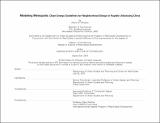Modeling metropolis : clean energy guidelines for neighborhood design in rapidly urbanizing China
Author(s)
Wheeler, Alexis M. (Alexis Marie)
DownloadFull printable version (13.98Mb)
Alternative title
Clean energy guidelines for neighborhood design in rapidly urbanizing China
Other Contributors
Massachusetts Institute of Technology. Center for Real Estate. Program in Real Estate Development.
Advisor
Dennis Frenchman.
Terms of use
Metadata
Show full item recordAbstract
In China's current landscape the paradigm for urban development is the rapid creation of whole neighborhoods instead of the conventional piecemeal approach of creating individual buildings that gradually aggregate over time into neighborhoods. China's approach is complex and fast moving, and has resulted in the highly repetitive form of tower-in-park typology being applied throughout the country to develop new neighborhoods. This development strategy creates living environments that require households to adopt patterns of daily living that consume excessive resources and needlessly contribute to climate degradation by relying on mechanically controlled interior climates in neighborhoods requiring excessive dependence upon automobiles. This situation presents compelling opportunities for planners and designers to create a more energy efficient city form. What is required is an effective method of accurately predicting, during the design process, patterns of neighborhood energy consumption. This thesis presents guidelines for doing this. When partnered with the Energy Proforma© the guidelines can help make possible rapid yet highly energy efficient urban design and development at the neighborhood scale. Development of these guidelines drew upon the research of the Making the Clean Energy City in China Research Group led by Dennis Frenchman and Christopher Zegras. Other resources include literature describing previous approaches to neighborhood scale designs and guidelines, and an examination of current and emerging practices in the field of urban design and development. Finally, student projects are incorporated into the thesis and interwoven with the guidelines to illustrate the forms that potential developments might take.
Description
Thesis (M.C.P.)--Massachusetts Institute of Technology, Department of Urban Studies and Planning; and, Thesis (S.M. in Real Estate Development)--Massachusetts Institute of Technology, Program in Real Estate Development in Conjunction with the Center for Real Estate, 2013. This electronic version was submitted by the student author. The certified thesis is available in the Institute Archives and Special Collections. Cataloged from student-submitted PDF version of thesis. Includes bibliographical references (pages 129-132).
Date issued
2013Department
Massachusetts Institute of Technology. Center for Real Estate. Program in Real Estate Development.; Massachusetts Institute of Technology. Center for Real Estate; Massachusetts Institute of Technology. Department of Urban Studies and PlanningPublisher
Massachusetts Institute of Technology
Keywords
Urban Studies and Planning., Center for Real Estate. Program in Real Estate Development.